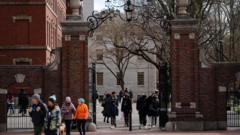In a bold stance for academic freedom, Harvard University has rejected the Trump administration's extensive demands regarding changes to its policies, reaffirming its commitment to independence amidst threats of financial penalties.
Harvard Stands Firm Against Trump Administration's Funding Ultimatum

Harvard Stands Firm Against Trump Administration's Funding Ultimatum
University maintains independence while responding to White House's demands on antisemitism policies.
Harvard University has made headlines by firmly rejecting a set of extensive demands issued by the Trump administration, which threatened the institution's federal funding unless it complied with proposed changes aimed at combating antisemitism on campus. The letter, sent by the White House, outlined requirements that included significant alterations to governance, hiring practices, and admissions procedures.
In response, Harvard emphasized its commitment to maintaining its autonomy and upholding constitutional rights. "The university will not surrender its independence or relinquish its constitutional rights," stated the university via its official X account on Monday. Harvard President Alan Garber highlighted that while the university takes its responsibility to combat antisemitism seriously, the government's request overstepped its authority. He argued that the demands posed a threat to the university's values as a private institution and jeopardized essential research funding.
The White House had claimed that Harvard had failed to meet conditions justifying federal investment and outlined ten required changes for the university to sustain its financial relationship with the federal government. These included reducing student and untenured faculty power, reporting individuals deemed "hostile" to American values to federal authorities, and engaging an external government-sanctioned entity to audit programs linked to antisemitism.
Under Trump’s administration, pressure on universities has intensified, with the accusation that they were not effectively protecting Jewish students and had developed a left-wing bias. Since his term began, significant amounts of federal funding have reportedly been frozen for various universities, impacting critical educational programs and resources.
In March, the administration's scrutiny had turned toward Harvard specifically, reviewing around $256 million in federal contracts alongside another $8.7 billion in ongoing grants. Amidst mounting tensions, Harvard faculty initiated legal action against the government, claiming violations of freedom of speech and academic freedom as issues at stake. This follows previous funding withdrawals from Columbia University after it agreed to some of the administration's conditions, a decision that sparked controversy among its student body and faculty.
With the ongoing Israel-Gaza conflict and rising tensions surrounding antisemitism, the balance between federal influence over academic institutions and their autonomy remains a pressing topic of discussion.
In response, Harvard emphasized its commitment to maintaining its autonomy and upholding constitutional rights. "The university will not surrender its independence or relinquish its constitutional rights," stated the university via its official X account on Monday. Harvard President Alan Garber highlighted that while the university takes its responsibility to combat antisemitism seriously, the government's request overstepped its authority. He argued that the demands posed a threat to the university's values as a private institution and jeopardized essential research funding.
The White House had claimed that Harvard had failed to meet conditions justifying federal investment and outlined ten required changes for the university to sustain its financial relationship with the federal government. These included reducing student and untenured faculty power, reporting individuals deemed "hostile" to American values to federal authorities, and engaging an external government-sanctioned entity to audit programs linked to antisemitism.
Under Trump’s administration, pressure on universities has intensified, with the accusation that they were not effectively protecting Jewish students and had developed a left-wing bias. Since his term began, significant amounts of federal funding have reportedly been frozen for various universities, impacting critical educational programs and resources.
In March, the administration's scrutiny had turned toward Harvard specifically, reviewing around $256 million in federal contracts alongside another $8.7 billion in ongoing grants. Amidst mounting tensions, Harvard faculty initiated legal action against the government, claiming violations of freedom of speech and academic freedom as issues at stake. This follows previous funding withdrawals from Columbia University after it agreed to some of the administration's conditions, a decision that sparked controversy among its student body and faculty.
With the ongoing Israel-Gaza conflict and rising tensions surrounding antisemitism, the balance between federal influence over academic institutions and their autonomy remains a pressing topic of discussion.





















